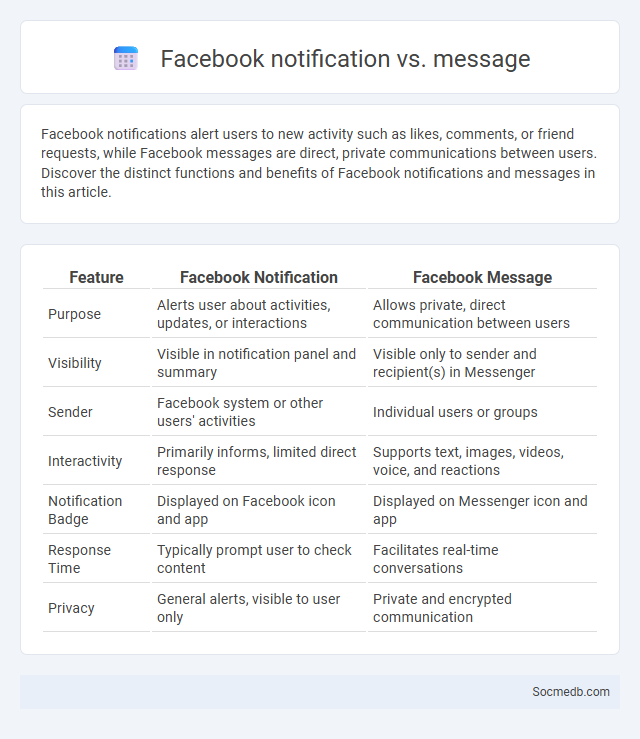
Photo illustration: Facebook Notification vs Message
Facebook notifications alert users to new activity such as likes, comments, or friend requests, while Facebook messages are direct, private communications between users. Discover the distinct functions and benefits of Facebook notifications and messages in this article.
Table of Comparison
| Feature | Facebook Notification | Facebook Message |
|---|---|---|
| Purpose | Alerts user about activities, updates, or interactions | Allows private, direct communication between users |
| Visibility | Visible in notification panel and summary | Visible only to sender and recipient(s) in Messenger |
| Sender | Facebook system or other users' activities | Individual users or groups |
| Interactivity | Primarily informs, limited direct response | Supports text, images, videos, voice, and reactions |
| Notification Badge | Displayed on Facebook icon and app | Displayed on Messenger icon and app |
| Response Time | Typically prompt user to check content | Facilitates real-time conversations |
| Privacy | General alerts, visible to user only | Private and encrypted communication |
Understanding Facebook Notifications: An Overview
Facebook notifications alert users to new activity such as comments, likes, friend requests, and event reminders, enhancing real-time engagement. These notifications can be customized in the settings to prioritize updates from close friends, groups, or pages users follow. Understanding the types and management of Facebook notifications improves user experience by reducing unnecessary alerts and ensuring important interactions are not missed.
What is a Facebook Message?
A Facebook Message is a private communication tool within the Facebook platform that allows users to send text, images, videos, and links directly to one or multiple recipients. This feature supports real-time conversations, group chats, and integration with other Facebook services like Messenger, enabling seamless interaction among friends, family, and businesses. Facebook Messages also include multimedia sharing and read receipts, enhancing user engagement and connectivity.
The Role of Notifications vs Messages on Facebook
Notifications on Facebook play a crucial role in alerting you to new interactions such as likes, comments, and friend requests, driving higher engagement through timely prompts. Messages offer a more direct and personal communication channel, enabling private conversations and meaningful connections between users. Understanding the balance between notifications and messages is essential for optimizing your Facebook experience and ensuring efficient social interaction.
Types of Facebook Notifications Explained
Facebook notifications include likes, comments, and shares that alert users to interactions with their posts, enhancing engagement. Friend requests and event invitations notify users of new social connections and upcoming activities. System alerts and updates ensure users stay informed about changes to privacy settings, new features, and security issues.
How Facebook Messages Differ from Notifications
Facebook Messages offer direct, private communication between you and your contacts, enabling real-time conversations with individuals or groups. Notifications alert you to activities like likes, comments, or friend requests, keeping you informed about social interactions without requiring immediate response. Understanding the distinction helps you manage your privacy and prioritize responses effectively on the Facebook platform.
Notification Center vs Messenger: Key Differences
Notification Center aggregates alerts from various social media platforms, providing a centralized location for updates such as likes, comments, and friend requests. Messenger focuses exclusively on real-time, direct communication, enabling you to send instant messages, voice notes, and multimedia files to individual contacts or groups. Understanding the distinction between these two helps streamline your social media experience by managing passive notifications separately from active conversations.
Real-Time Engagement: Messages vs Notifications
Real-time engagement on social media thrives when your messages provide immediate, personalized interactions that foster meaningful conversations, unlike notifications which often serve as generic alerts. Messages prioritize direct connection by enabling two-way communication, making users feel heard and valued instantly. Optimizing your social media strategy to focus on message-driven engagement can significantly boost user interaction and brand loyalty.
User Privacy: Notifications vs Messages Handling
User privacy in social media hinges on how notifications and messages are handled, with end-to-end encryption playing a crucial role in securing message content from unauthorized access. Notification settings allow you to control the visibility of sensitive information, preventing private messages from appearing on your lock screen or notification banners. Proper management of these features helps safeguard your personal data and maintain confidentiality in digital communications.
Best Practices for Managing Facebook Alerts
Managing Facebook alerts effectively involves customizing notification settings to prioritize important updates while minimizing distractions. You should regularly review and adjust alerts for comments, messages, and friend requests to stay informed without overwhelming your feed. Using the Facebook dashboard to organize and filter notifications ensures a streamlined experience aligned with your engagement goals.
Choosing the Right Communication Channel on Facebook
Choosing the right communication channel on Facebook involves leveraging features such as Messenger for private, real-time conversations and Facebook Groups for community engagement and targeted discussions. Utilizing Facebook Pages allows businesses to share updates, respond to customer inquiries, and build brand presence through posts, comments, and live videos. Analyzing audience behavior and engagement metrics on these channels helps optimize communication strategies and enhance user interaction.
 socmedb.com
socmedb.com